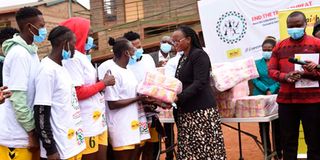End menstrual poverty

Health Principal Secretary Susan Mochache distributing sanitary pads to girls at Mathare Youth Sports Association Grounds in Nairobi on July 5, 2022. A million girls miss school monthly as they cannot afford sanitary towels, which greatly disrupts their academic performance.
What you need to know:
- About 65 per cent of women and girls cannot afford sanitary pads yet it is a basic human right to manage our bodies with dignity.
- A million girls miss school every month as they cannot afford sanitary towels, which greatly disrupts their academic performance.
- Some are forced to use materials like animal skin, chicken feathers, rags, cheap mattresses and newspapers as alternatives yet they are unhygienic, hence unsuitable.
The recent general election saw an unprecedented number of women ascend to various elective positions.
Seven governors, from a previous high of three; three senators, from none before; and 23 new MPs are women.
However, the long-awaited celebration of gender parity in elective positions should not be in vain.
The elected female leaders, being alive to the challenges that women go through, should help the girl-child to overcome menstrual poverty and the related shame.
About 65 per cent of women and girls cannot afford sanitary pads yet it is a basic human right to manage our bodies with dignity.
In 2018, President Uhuru Kenyatta signed into law the Basic Education Amendment Act, 2016.
The Act placed on the government’s shoulders the responsibility of providing free, sufficient and quality sanitary towels to every girl registered and enrolled in a public basic education institution who has reached puberty.
It aimed at minimising absenteeism and putting schoolgirls on par with the boys.
However, sanitary towels are still considered a luxury. A million girls miss school every month as they cannot afford sanitary towels, which greatly disrupts their academic performance.
Some are forced to use materials like animal skin, chicken feathers, rags, cheap mattresses and newspapers as alternatives yet they are unhygienic, hence unsuitable.
The situation is atrocious in that one in 10 15-year-old girls is reported to engage in transactional sexual relations to obtain money for buying sanitary towels.
Some have confessed to sharing used pads in the spirit of looking out for one another, oblivious of the unhygienic impact it can have on them.
The newly elected women leaders should transform this devastating limitation of the basic product that has a huge impact on the girls’ future, safety and wellbeing.
In collaboration with the national and county governments, civil society and the community, they should ensure girls have monthly access to free sanitary towels at their school.
Ms Akoth is a health and lifestyle writer. [email protected].




